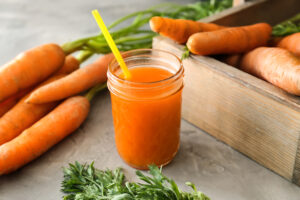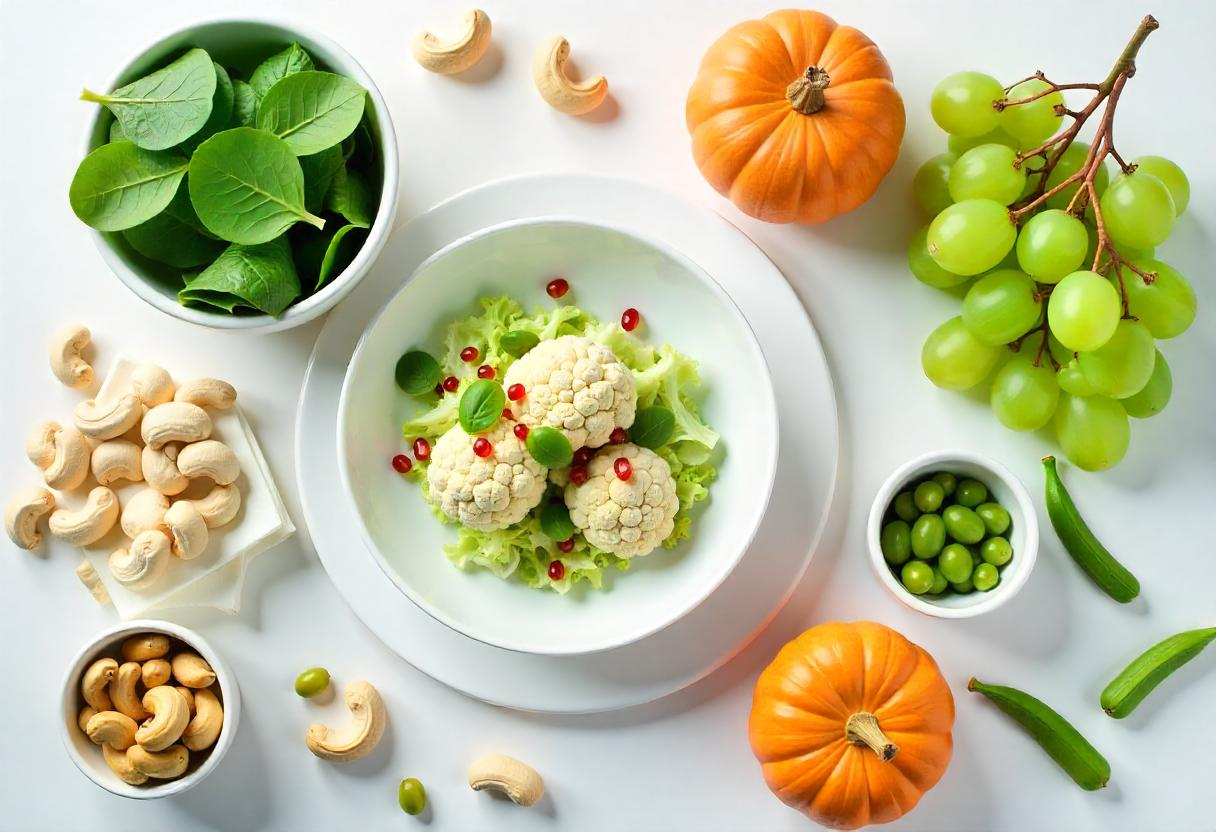Vitamin K might not be the most talked-about nutrient, but it plays a crucial role in keeping you healthy. It’s essential for blood clotting, bone strength, and heart health.
Without enough vitamin K, even a small cut could lead to excessive bleeding, and over time, weak bones and heart issues could develop. The good news? Indian cuisine offers plenty of delicious and accessible sources of vitamin K, from leafy greens and vegetables to herbs, oils, and fermented foods.
In this blog, we’ll explore the importance of vitamin K, how much you need, and the top Indian foods rich in this vital nutrient.
Why Is Vitamin K Important?
Vitamin K is best known for its role in blood clotting. When you get a cut, your body activates proteins that depend on vitamin K to form clots, preventing excessive bleeding. But that’s not all—it also strengthens your bones by regulating calcium. Without enough vitamin K, your body can’t effectively bind calcium to bone tissue, making your bones weak and more prone to fractures.
Interestingly, vitamin K also supports heart health. It prevents calcium from accumulating in your arteries, reducing the risk of heart disease. By regulating calcium levels, vitamin K helps maintain flexible and healthy blood vessels, promoting better circulation.
How Much Do You Need?
The recommended daily intake of vitamin K depends on age and gender. For adults:
- Men need about 120 mcg per day.
- Women require around 90 mcg daily.
Children need less, around 30–75 mcg, depending on their age. Most people can meet their daily requirements through a balanced diet, especially when incorporating vitamin K-rich foods regularly.
Here, we use 120 mcg to calculate the Daily Value (DV) for vitamin K.
Vitamin K-Rich Foods in India
1. Green Leafy Vegetables
When it comes to vitamin K, green leafy vegetables take the crown. Fortunately, Indian cuisine makes use of plenty of these nutrient-rich greens in everyday dishes.

Spinach (Palak) is one of the best sources of vitamin K, providing 445 mcg per half-cup (90 grams) when cooked. That’s a whopping 370% of the daily value, making it a powerhouse for bone and heart health. It’s a regular ingredient in Indian curries, dals, and saag, making it an easy and delicious way to boost your intake.
Fenugreek leaves (Methi) are another excellent source, offering around 400 mcg per 100 grams, or 333% of the DV. Methi paratha or methi sabzi not only adds flavor to your meals but also gives you a healthy dose of vitamin K.
Amaranth leaves (Chaulai) are a lesser-known yet incredibly rich source of vitamin K, providing 1140 mcg per 100 grams, which is a massive 950% of the daily value. However, the vitamin K content in cooked leaves is not well-documented, as research on its retention after cooking is limited.
Often overshadowed by more popular greens like spinach and fenugreek in urban areas, amaranth leaves remain a staple in rural India.
Even coriander (dhania), commonly used as a garnish, contributes to your vitamin K intake. Just a quarter cup—or a sprinkle of around two sprigs—of fresh coriander leaves on your curries or chaats adds both flavor and nutrition, providing 10% of the DV of vitamin K.
2. Cruciferous Vegetables
Cruciferous vegetables, known for their cancer-fighting properties, are also good sources of vitamin K.
Broccoli, though not traditionally Indian, has become popular in urban kitchens. One cup (156 grams) of cooked broccoli provides 220 mcg, or 183% of the DV, making it an excellent addition to salads, stir-fries, or even mixed vegetable curries.
Closer to home, cabbage (patta gobhi) offers about 164 mcg per cup (150 grams), which is 137% of the DV. It’s commonly used in Indian curries, poriyal, and stir-fries.
Cauliflower (gobi), a staple in Indian households, contains around 17 mcg of vitamin K per cup (124 grams), which covers 14% of the daily recommended value. Though not as rich, it’s still a valuable contributor, especially when combined with other vitamin K-rich vegetables.
3. Fruits
While fruits aren’t the richest sources of vitamin K, some Indian native varieties contain moderate amounts that contribute to your daily needs.
For example, a half-cup (87 grams) of arils (seed/juice sacs) of pomegranate (anar) provide around 14 mcg of vitamin K, covering 12% of the daily requirement. Besides being a vitamin K source, it’s also loaded with antioxidants, making it a healthy and flavorful addition to your diet.
Similarly, half a cup (75 g) of grapes (angoor) offers 11 mcg of vitamin K, fulfilling 9% of your daily needs. These juicy, bite-sized fruits make for a convenient and refreshing snack, offering a small yet valuable vitamin K boost.
4. Holy Basil (Tulsi)
Basil (Tulsi), revered in India for its medicinal properties, is also a rich source of vitamin K, providing 415 mcg per 100 grams.
Although you won’t consume large quantities, adding 2 tablespoons of tulsi leaves to your tea offers 18% of the daily value, while half a cup used for garnishing provides 41%, giving your dish a nutritious boost.
Including tulsi in teas, salads, or chutneys enhances both flavor and health benefits.
5. Soybeans and Soybean Oil
Soybeans, a staple in many Indian dishes, are not only rich in plant-based protein but also an excellent source of vitamin K.
A half cup (92 grams) of cooked soybeans provide around 22 mcg of vitamin K, which meets 19% of your recommended intake.
Though soybean oil is not as commonly used in Indian kitchens, one tablespoon (14 grams) contains about 26 mcg, fulfilling 21% of your daily requirement.
Including soy-based foods or cooking with soybean oil is an easy way to boost your vitamin K intake.
6. Carrot Juice

Carrot juice, a popular and refreshing drink, offers a small yet valuable dose of vitamin K.
A single-cup (240 mL) serving provides around 37 mcg of vitamin K, which contributes 31% to your daily intake.
While not as rich as leafy greens, it’s still a nutritious addition to your diet. Plus, carrot juice is packed with beta-carotene, which supports eye health, making it a wholesome beverage that offers both vitamin A and K benefits.
7. Pumpkin
Pumpkin (kaddu), though not a staple, is a nutritious addition to Indian meals and a good source of vitamin K.
A half-cup (115 grams) of cooked pumpkin provides about 4 mcg of vitamin K, or 3% of your daily needs. Interestingly, the same serving of canned pumpkin (123 grams) contains nearly 20 mcg, fulfilling 17% of the DV.
This variation is likely due to seasonal differences, regional varieties, and cooking methods, though canned pumpkin is rarely used in India, where fresh pumpkin is preferred.
Including this versatile vegetable in curries, sabzis, or soups is a tasty way to boost your vitamin K intake while enjoying its earthy sweetness and health benefits.
8. Edamame
Edamame, or young soybeans, are a nutritious and delicious source of vitamin K.
A half-cup (80 grams) of cooked edamame provides around 22 mcg of vitamin K, which accounts for 18% of the daily dietary value.
These tender beans are not only rich in plant-based protein and fiber but also offer a good dose of vitamin K, making them a wholesome addition to your diet.
Enjoy edamame steamed, stir-fried, or tossed into salads for a tasty and nutrient-packed boost.
9. Lady’s Finger
Lady’s finger (bhindi), a popular vegetable in Indian cuisine, is a good source of vitamin K.
A half-cup (80 grams) of cooked slices provides around 32 mcg, covering 27% of the DV. Known for its slimy texture and fiber-rich goodness, lady’s finger adds both flavor and nutrition to meals.
Whether stir-fried, added to curries, or enjoyed in sambar, it’s a delicious way to boost your vitamin K intake while supporting bone and heart health.
10. Cashews
Cashews (kaju), a popular nut in Indian cuisine, offer a small but valuable dose of vitamin K.
One-ounce (28-gram) serving of cashews provide nearly 10 mcg of vitamin K, which delivers 8% of your daily nutrient needs. Though not as rich in vitamin K as some leafy greens, cashews are still a nutritious addition to your diet, offering healthy fats, protein, fiber, and minerals.
Enjoy them as a snack, in curries, or blended into creamy gravies for a flavorful and nutrient-packed boost.
Tips to Boost Vitamin K Absorption
Since vitamin K is fat-soluble, consuming it with healthy fats enhances its absorption. Here’s how to make the most of your vitamin K intake:
- Drizzle a bit of ghee or oil over cooked greens.
- Add nuts or seeds to salads or snacks.
- Include fermented foods like curd regularly in your meals.
Closing Thoughts
Vitamin K may not always be in the spotlight, but it’s essential for strong bones, healthy blood, and a happy heart. Thankfully, Indian cuisine is brimming with vitamin K-rich ingredients—from leafy greens and herbs to oils, nuts, and fruits.
By incorporating these nutrient-packed options into your daily meals, you can easily meet your vitamin K needs and boost your overall health.
References:
- National Institutes of Health NIH Office of Dietary Supplement Factsheet on Vitamin K
- U.S. Department of Agriculture FoodData Central

1 thought on “Top 10 Vitamin K-Rich Foods in India”
Comments are closed.